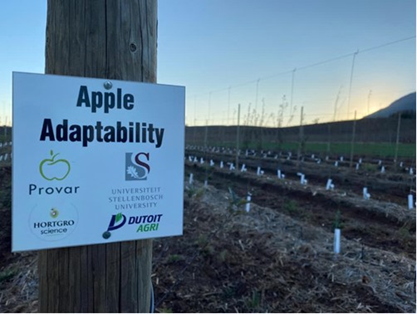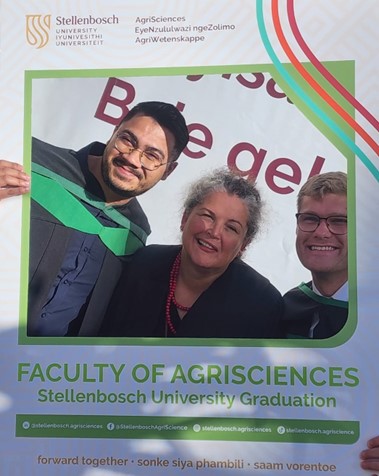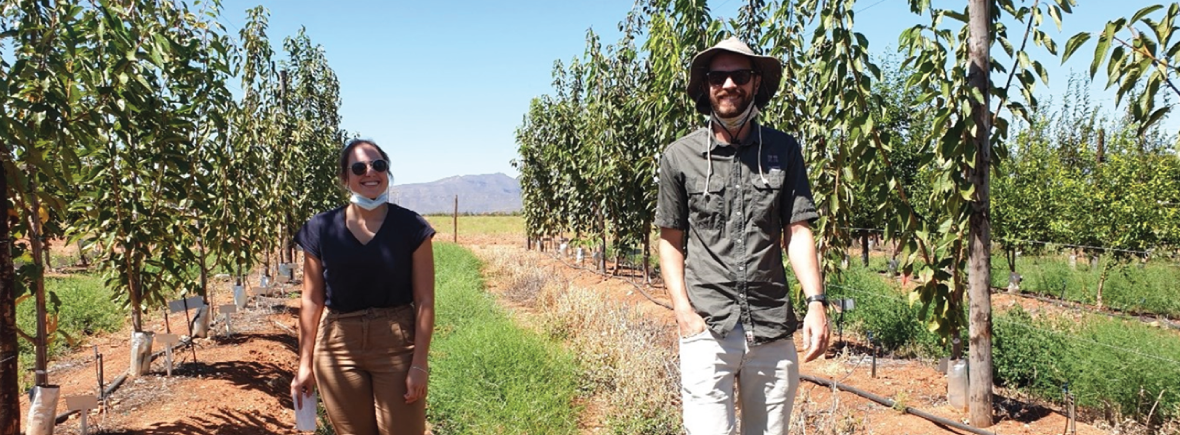Figure 1: (Anika and Tristan walking in the orchard): Anika Kock and Tristan Dorfling recently completed their MSc degrees on the genotype-by-environment studies during the establishment years of the plum (Anika) and apple (Tristan) trees of the PHEPP. Photo: Provided by Provar.
In the light of climate change and sustainable fruit production, the Department of Horticultural Science has joined hands with Hortgro (SA’s deciduous fruit industry body) and Provar (independent cultivar evaluation company) to study the adaptability of apple, pear, plum and cherry trees to contrasting climatic conditions. Deciduous trees need exposure to sufficient low temperatures in winter for synchronized flowering in spring. If winter chill is inadequate, many aspects of the tree physiology are affected leading to delayed and decreased bud break affecting tree architecture and growth, and a protracted bloom period that culminates in lower yields and fruit quality. Producers have to rely on chemical rest breaking and special pruning techniques to ensure sustainable production. Deciduous fruit tree cultivars have varying degrees of response to environmental conditions and understanding this variability will assist producers in selecting cultivars that are better adapted to their specific growing conditions.
To study the adaptability of deciduous fruit trees under South African growing conditions, the ProHort-Ecophysiology Platform (PHEPP) was established as a multi-environmental field laboratory where the genotype-by-environment interactions can be studied. In 2019, ten different genotypes from each of the crop type (apple, pear, plum and cherry) were planted in three contrasting climatic areas. All phenotypical aspects of these trees are measured and quantified to generate a database from which the answers to many fundamental and applied questions can be mined. Hortgro serves as the funder and enabler for the PHEPP, while Provar is responsible for managing the data collection and mentoring of the student researchers.

Figure 2: (Apple adaptability sign)
PHEPP is a field laboratory created through the collaboration of academia and the deciduous fruit industry to study the adaptability of apple, pear, plum and cherry cultivars. Photo: Esmé Louw
The Department of Horticultural Science lead the academic footprint while training the postgraduate students. Currently there are six MSc students involved in the project. To date this collaboration has resulted in the graduation of four cum laude MSc students, presentations at national and international symposia and several feed-back sessions to the deciduous fruit industry. Recently, this project has also attracted the interest of international researchers with Prof Lee Kalcsits (Washington State University) completing a three-month sabbatical in the Department collaborating on a Hortgro-funded project utilizing the PHEPP to study the development of apple sunburn. In 2025, Prof Stefano Musacchi (Washington State University) hope to join the Department of Horticultural Science on a six-month sabbatical to investigate how climate influences tree architecture with a special focus on alternate bearing behaviour and the extinction of fruiting positions.

Figure 3: (Chad, Esme and Karel graduation): Chad van Wyk and Karel Vahrmeijer with their MSc supervisor, Dr Esme Louw, at their graduation. Chad and Karel investigated the genotype-by-environment interactions of sweet cherry trees to diverse climatic conditions. Photo: Elke Crouch
As the trees are now coming into full bearing, the research will expand to include the complexities of producing high volumes of top-quality fruit in a changing and increasingly challenging environment. The establishment of the PHEPP is a success story with high impact made possible by the joining of hands of academia and industry to create a better future in agriculture.

